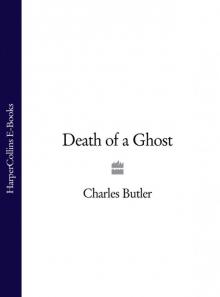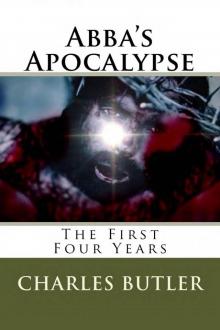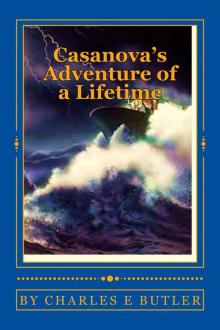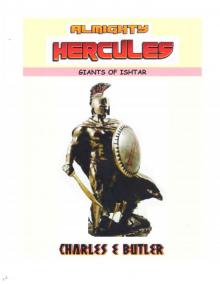- Home
- Charles Butler
Death of a Ghost Page 3
Death of a Ghost Read online
Page 3
The meadow was dark and lush, shadowed in part by the house and by its own river border of willow and silver birch. In wet weather, the river could break its banks and spread a sudden lake there. You could find minnows jungled in the long grass, a drowned canopy of gnats and thistledown. Here too, wading to the knee, Ossian had once walked with Colin to fish with shrimping nets and chased an eel across the lawn as far as the drooped willows.
How long ago was that? Seven years?
It felt like another life.
Ossian lolloped at a diagonal from the house towards a fence where the Lychfont grounds ended in a field of sheep. The flood meadow was dry now, but still soft and peaty underfoot. All this time he knew he was being followed. The black mullioned windows of the hall behind him were unoccupied and his view up the sloping lawn gave no chance of cover. In the shadow near the house, where the long grass was uncut, he saw no footprints but his own. It didn’t matter; Ossian knew. A ghost had drifted from the stonework and latched on to him. Its atmosphere of puzzled disappointment had resonated, probably, with his own.
Ossian decided to be friendly. He stopped. The ghost stopped and watched him staring back up the slope. Its long sickly face quivered like a reflection in a pool. Ossian smiled a little, encouragingly – but his smile shot it to ribbons, sliced its joints like cockcrow. It fell in pieces, then laboriously reassembled itself and followed again, dog-like, without rancour. It tracked him along the fence, where the ground grew flat and tussocked. Ossian had no choice but to let it. It did not mean him harm. It shimmered just behind the grass, a green miasma. He guessed what that green colour meant. This ghost had died violently and young.
At the edge of the wood he stopped and looked back again. The ghost was still there, dogging him at thirty metres. The body was just as thin but more distinct now; he could see long fingers and a belt of tools that clinked silently at each step. The legs were bare stalks of flesh. And that sickly face? Ossian blinked into the greenness of the river meadow rising up behind. The face was yellowish – brass. It was a metal face! The long, kind, sickly features were gone and Ossian saw jagged mask holes where no light shone, and brass lips rounded as if to speak his name…
“Ossian!” it shouted. “Ossian! Ossian! Ossian! Ossian!”
Ossian turned and ran back to the house.
SULIS’S SHERBERT was finished long since, but the scryer was still explaining about temporal dispersal. The intricacies of human history animated him as few other subjects did, and his curl of white beard wagged puppyishly as he talked. Sulis listened with patience at first, until the scryer unwisely returned to his comparison between time and a beam of light. Entering a spiritually impoverished world, he told her, was like shining a light on to polished crystal. The light would be refracted into many colours and directions. “A marvellous sight, but one signifying disintegration…”
Before long, Sulis was not even pretending to pay attention. Her mind still ran on the humiliation of her abandonment. Every now and then it came back to her and shook her by the throat, in spiteful little sobs. It made all too much sense. Ossian could never have escaped her except by flying to some vulgar place where her own transcendent purity could not easily follow. And he would certainly pay – refracted, dispersed and impoverished as he might be.
“…so you may find he eludes you merely by shifting to another part of the, er, spectrum as it were.”
The scryer was waiting for a response. The point of his speech had been clear, at any rate. Following Ossian would be risky, no matter why. And the old man’s concern was genuine, Sulis guessed, for all his ludicrous verbosity.
She looked around her. Lychfont’s marble reflected in its extreme whiteness the snowy pallor of her own face, and her turquoise eyes were brindled with gold and lapis lazuli. Two colonnades fanned from where she sat, the space between them crossed with walks and pools and fountains. The sky, as always, was kingfisher blue, the earth her own blood red, and rising from its depths a wondrous perfume clothed the air in dark velvet. Sighing, she breathed the smoke of a thousand sacrificial fires.
It was all very beautiful. And should she give this up, even if only with part of herself, even for Ossian? Although she had laughed it off, the scryer’s warning had shocked her. Might she really forget her own divinity? What if she should become trapped in the tawdry sphere of existence where Ossian had taken refuge? She could not bear the thought of being tawdry.
“Ossian always was weak-minded,” she said. “He needed me, you see, to keep him steady. That’s why we were so perfectly matched.” She broke down again and a tear snaked down her cheek: “I’ll wring his neck!”
“He is unworthy of you, lady,” put in the scryer’s clerk.
He soon regretted it. Sulis was suddenly towering over him, her golden hair scraping the rafters. “Unworthy? Is that how you speak of my consort, little man? Am I a green girl to be soothed with childish comforts? How dare you!”
“My colleague spoke ill-advisedly,” hastened the scryer, stepping between them. “He meant no harm, lady. Pardon his folly.”
Sulis moved towards the clerk, whose legs were trembling so that they could scarcely bear him. She pointed one finger at him then, slowly, raised it to the roof. The clerk rose too – ten metres into the air, his feet wriggling. He floated out to the nearest pond, then Sulis closed her fist and let him fall. There was a yelp, a splash.
“Consider him pardoned. And now, scryer, let us prepare the cauldron and the irons. There has been too much delay.”
“THAT WAS HIS own fault, surely?”
“Not at all. The poor man just blundered into the wrong part of the forest. Hardly a capital offence.”
“You can’t expect Diana to see it that way. The Olympians are so touchy.”
Catherine’s house guests were talking about gods. The walls of the saloon were thick with them. Her great-great-uncle had toured Italy at a time when prices were low and brought back a job lot, packed in crates. Ossian found Catherine and the others examining an oil of the hunter Actaeon, stumbling between green bushes on to the bank of a lake. There, by the light of her own immortal face, the goddess Diana bathed naked with her maidens. The deer Actaeon had been chasing could be seen, its hind flank at least, leaping out of the scene stage right, forgotten. The hunter’s face was all surprised embarrassment, delight and fear. If he guessed what punishment the goddess would ordain for his intrusion – to be turned into a deer, chased and eaten by his own hounds – that handsome and rather stupid face betrayed nothing of his knowledge.
“The brushwork on his spear is very fine,” said Catherine.
Ossian turned away and gave a jump as he saw Sue Frazer sitting on the sofa behind him. The truth was, he had quite forgotten her existence. He blushed to think of it.
Sue was ignoring them all. She was alone on the sofa, trying to concentrate on a book. Between her fingers, Ossian recognised the broken crosier, the mitre in a pool of blood. Murdering Ministers. An Inspector Gordius mystery! It might be a good way to open a conversation. That was hard, though. Sue was not exactly taking up the whole sofa, but her leg was crooked under her thigh, with a knee sticking out horizontally to ward off approach. She did not look as if she wanted to talk.
What was there to say about Sue Frazer? The moment Ossian wondered this, a neat packet of knowledge fell open in his mind. Sue was Colin’s half-sister: early twenties, bright, sardonic, keen on horses. It was a cause of continual jibing between her and Colin. Horses made Colin sneeze – a shameful allergy for one born to the saddle and he got teased unmercifully for it. It had always been like that. How could Ossian have forgotten?
Sue had been shielding her face with the book. Now, sensing Ossian’s presence at her side, she lowered it and looked up at him curiously.
“Ossian? I was wondering what had become of you.”
Ossian stared back. He had seen girls as beautiful as this one – but not many. Colin’s sister’s long hair was pale, with a lustre as if there were s
ome faint light backing it. Her face was an oval and the corners of her eyes tapered orientally, framing irises that were a greeny sea-blue. But it was her skin that made him gape. Her skin was so perfect as to be almost repellent. She might have been wearing a porcelain mask. Only her eyes were mobile and alive – and they darted back and forth as if looking for somewhere to hide. Ossian felt something irresistibly needy in that glance, something lost and far from home. He wanted to rush and assure her that in him, at least, she had one true friend in the world.
“Any murders yet?” he asked lightly, indicating the book.
“Three and counting,” Sue smiled, marking her page with a dog-ear. “Though the first looks like it may be accidental. You’ve read it?”
“A long time ago.”
“Oh good!” she smiled, and made room for him on the sofa. “Now, tell me who to suspect.”
Ossian shook his head. “All a blur. It was ages back, like I said.”
“At least promise me it isn’t Sergeant Rosie O’Shea,” Sue pouted. “I’ve taken a real liking to her. How does she put up with that pig of a boss?”
“O’Shea?” Ossian rummaged for the name. “Oh yes, the Irish sergeant. No, she came back in Legal Tender, so you’re probably safe.”
“Not another Inspector Gordius fan!” said Colin, joining them.
“My brother has no interest in fiction,” explained Sue.
Colin acknowledged this with a shrug. “Who needs the extra confusion? Real life’s weird enough already.”
“But that’s just where you’re missing out,” objected Sue. “With books you can force the universe to make sense. Inspector Gordius always gets his man.”
“Well, I’m jealous. For me there’s no escape from reality. Is it any wonder my hands are shaking?”
Sue looked at her watch. “Never mind, you’ll be able to get a drink soon,” she smiled.
“Yes, people always ask about those,” Catherine was saying, as the party turned to a less mythological wall, where in a line above the piano three small frames were overrun with leaf and bush – souvenirs from the Purdeys’ previous visit. “Aren’t they lovely? Why, thank you. I can never decide which I admire more – the technical virtuosity or Jack’s inspired mangling of his commission. He was asked to paint three views of the house and wilfully chose to misunderstand, the impossible man.”
“I can’t make out the house at all,” said one of the guests, peering into the watercolour foliage. “In fact, this one’s very much what I see from my room—”
“That’s the joke, though! These are views that the house has, not views that we have of the house. You see that floating dab of white down there? That’s me, apparently. Looking no more significant than a petal.”
“Ephemerality then,” observed the guest, “is the theme of this sequence?”
“Or, in a different way, endurance,” Catherine agreed. “How much these four walls must have witnessed! Yet here they still are, basking comfortably while we scurry around on our little errands. That’s what Jack was trying to say, wasn’t it, Jack?”
“Oh, I’m the last person to ask,” said Jack, rather pompously. “Once the paint dries I disown it. I set it adrift to sink or swim.”
“Oh, it swims, it swims!”
“Certainly it does,” said Mr Frazer, on a rare visit from his study. Even in his own house he wore a suit and tie, and his bald forehead glowed with summer heat. “Do you know Gluck’s work at all?”
Colin took Ossian’s elbow and drew him aside to ask conspiratorially: “Fancy dodging out to the King’s Head later? You could pass for eighteen, easy.”
“He’s not luring you to the pub already, is he?” asked Sue, whose hearing was excellent. She rose from the sofa and drifted like a mist to stand behind them.
“Ossian and I are going to relive past times, aren’t we, Ossian? We’ve a lot of catching up to do. Don’t suppose you want to come?”
“I’d be too embarrassed, the way you drool over that barmaid.”
Colin shot her an unpleasant look. “What did I say, Ossian? A fantasy world.”
“Now, children,” said Catherine cheerfully, choosing to notice Colin’s tone. “They’re terribly fond of each other really,” she explained to the guests.
“We enjoy arguing,” agreed Sue vigorously. “It’s good for the circulation.”
“But it’s such a waste of time, darling.”
“Time’s what we have plenty of,” said Sue, taking a pastry from the tray. Ossian didn’t see her eat it, but when he looked a little later it was gone and her lips were innocent of crumbs.
Ossian was restless. He moved to the French window and stepped on to the terrace beyond. At once he was ambushed by the heat. He waded through it, hugging the wall where the sun had stencilled a stiletto of shade. A brick arch let him into the kitchen yard, where the house’s grandeur lapsed into a random shabbiness, messed with bins and sheds.
In this large house solitude was strangely hard to find and for a while he cherished the abrupt leeward silence. A windowless height of red brick leaned out against the sky to shelter him and shrank the house guests’ chatter to a querulous hum. Through the frame of the arch, the flowerbeds and lawns sloped down and out of sight. He took a breath and held it, imagined he could hold the moment too. He felt, for that precarious instant, quite content.
Then the ghosts came for him.
He smelt them, first of all. First came the scent of freshly-dug earth, the rich steam of black earth newly turned. Out in the garden he heard the slice of a bright clean blade, soil angled out by a booted heel. Instinctively, he grasped his neck and at once the earth smell became stronger, colder, a memorial fugue of growth and decay.
“Not again!” he murmured. “Can’t you leave me alone?”
Into that empty space they streamed. From jarred doors, unlatched windows they fell in soft drifts and billowed out of the loose soil where the late roses bloomed. Little by little, they became defined against each other, spiralling through the August heat. Now he saw their faces, some of them, bleached and torn faces with the skin hanging open, loose as unbuttoned shirts. One’s jaw had been smashed in with a hammer. Another was missing the back of its head; a concave scatter of bone showed where the skull should have been. Two had cords about their throats and between them stood a young man who had been run through with a sword. It had entered the small of his back and been thrust upward, its wraith of blade protruding from his mouth like an iron tongue. None had died quietly.
Ossian shrank from them. They would not harm him, he knew. They were phantoms. But their misery stirred such horror in him that he wished only to sink down and shroud himself in the long grass. They were pressing closer, muffling his face, telling him desperate stories, in whispers thin as water… He gasped for breath and pressed his body up against the wall. When he punched, the faces would swirl to nothing about his fist, then re-form and eddy, settle with infinite patience. Behind him, the door into the kitchen was open a little way. He pushed through neck-high and slipped inside, then turned to heave it shut.
But there was no need, for the ghosts had already lapsed, folded back into the complex shadows of the yard. He looked around the kitchen, shaking, and barely recognised the place. Stacks of unwashed plates towered there and the hanging knives glittered, and by the open window a set of crystal wind chimes sang in brittle whispers. Otherwise, the room was silent; but its silence was merely stifled noise, hysterical. The grandfather clock two rooms away was ticking like a bomb.
“Who’s there?” asked Ossian uncertainly, and hoped with all his heart that no one would reply.
No one did. But something began to move from the Welsh dresser at the far end of the kitchen. It was hardly more than a wash of blue-black colour. Halfway down, it reached the meat knives where they hung from their hooks – a little dusty, but still gleaming – and paused. One of the knives swung a little, as it might in a gentle breeze or if some tentative finger were testing its edge. At that momen
t, Ossian even saw the hand itself, a hand tanned and calloused, but not so very different from his own, blooming out of nothingness and as suddenly tucked back. Then the ghost hurried on, past Ossian and through the side door to the hall. Ossian felt no breeze, but there was a flexing of the air as the room bulged a little to let it pass. He blurted out: “What is your name? What are you afraid of?”
The ghost heard him. It bristled. The light in the hall shimmered behind it, tracing patterns of flux, and the skin on Ossian’s arm stood stiff as frosted grass. Then – no, he could not say that he saw anyone there, but he heard as clearly as if the voice had been his own:
“My name is Ossian!”
The shadow scuttled from him and was followed along the hall tiles by the clip of nailed dog feet. Ossian launched himself after, almost slipping on the polished floor.
“Careful!”
Sue was just coming in by the same door. She carried a tray of empty glasses, which she lifted skilfully as he steadied himself against the door frame. “Where are you off to in such as hurry?”
“Nowhere!” he said, looking beyond her to the hall. “I’m sorry – I was just – being clumsy.”
“I see,” Sue smiled, placing the tray with the others on the long counter. Her smile was thoughtful and somehow hungry. “You look like a volunteer for the washing up to me. No, don’t duck out. Our housekeeper’s gone home for the weekend and now the machine’s packed up in sympathy. I’m relying on you.”
Ossian still hung back. “I only came in for some water.”
“If you turn up in kitchens, you must expect to be press-ganged. It would be nice to have the company, anyway. We can compare Gordian notes – yes?” She filled the sink with an iridescent froth of bubbles and hot water.
Ossian hesitated. Then that enigmatic smile opened and engulfed him. It occurred to him again how very attractive Sue really was. “Of course,” he said, as she tossed him a damp Woodland Trust tea towel. “Ossian Purdey, at your service.”

 Death of a Ghost
Death of a Ghost Abba's Apocalypse
Abba's Apocalypse Casanova's Adventure of a Lifetme
Casanova's Adventure of a Lifetme Almighty Hercules
Almighty Hercules